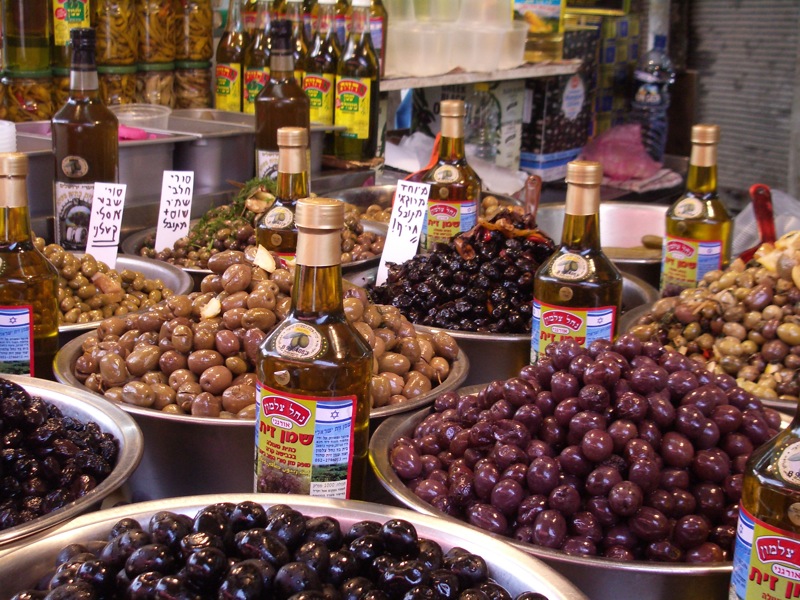Writer and part-time pig farmer, Jeff Yoskowitz, was at the recent Shavuot Slow Food market in Tel Aviv – and had mixed feelings about the artisan cheeses, meats and organic veggies on offer.
The Carmel Market shuk in Tel Aviv that so many travelers love — the idyllic market which people see as representative of the simpler way vegetables and other foodstuffs were once sold — is actually the source of so much frustration for me.

Aside from the problem that all of the produce is fully conventional, I spend most of my time there yelling at vendors, being bumped (and bumping back) and trying my best not to be cheated.
While my blood pressure rises and I suffer the consequences of a thick American accent, I wax nostalgic about the farmers markets I frequented in Providence, Rhode Island, before I moved to Tel Aviv.
Now those are markets.
The vendors are usually the farmers themselves or their workers (or the people they hire to sell their stuff), and people are nice to you. They even smile. In fact, rather than the dog eat dog milieu of the shuk, the farmers market represents an eating community where people all respect each other for their role in this chain, from the grower to the cook to the consumer, etc.
In so many ways I saw the shuk as a symbol of Israel, with all its frustrations, and the farmers market a symbol of my beloved America, in all its splendor, and in comparing the two I observed just how irreconcilable they were.
Then, on behalf of the Jewish harvest festival, Shavuot, Tel Aviv had to go ahead and start a Slow Food inspired farmers market…and further confound my already uncertain identity issues around food in Israel. When my neighbor told me about this new market I was jubilant; I actually canceled all my plans for Friday afternoon. I biked with my neighbor to what I hoped would be the very bridge between my old home and new home. It wasn’t.
I spent two hours there and left with new questions and two conflicting feelings. The first was that it felt like home, both for better and worse. There were artisanal meats and cheeses, fair trade olive oils and vinegars and coffees, loads of incredible looking fresh and mostly organic fruits and vegetables, as well as some of the farmers themselves.
People knew about their food and products and could have intelligent conversations about farming methods and fair trade policies. I felt like part of the farmers market community I had felt a part of in Providence. It was a beautiful sight as well because the market was held at the old Tel Aviv port, with the Mediterranean as an uncanny backdrop. And it just felt nice to be shopping with a backpack and a tote, not guarding myself or my money as I do in the shuk, just casually tasting cherries and blueberries, wines and olives.
And yet, the other feeling I had was one of disappointment with Israel. While it’s just a start to the movement here, this farmers market just did some things plain wrong and contrary to so many of my own values and those that I attribute to the farmers markets of home.
For starters, the meat wasn’t kosher and I couldn’t eat it. When this happens in the US I understand it, but if there’s one place I should be able to buy kosher home-prepared pastrami I’d expect it to be this particular venue. There were also coffee stations where fair trade organic coffees were being sold in disposable plastic cups, with plastic lids and straws.
A pickle vendor (the only one) sold lacto-fermented pickles in cheap plastic containers which certainly leached plastic into the brine and probably the pickles as well. I asked the man why he didn’t use glass and he said, with disdain, “this is what we have.” Then I inquired about his lemonade (also sold in wasteful plastic cups) and it cost ten shekels a pop, with no promise of it being organic or low sugar or anything special. As thirsty as I was I would not pay a fortune for a few sips of lemonade when at the shuk fresh lemonade, which is not too sweet, costs two shekels.
In fact, this farmers market was so ridiculously expensive as compared to the shuk that I only bought purple potatoes and blackberries and then left after sampling all the free foods I could. The choice to hold the market at the port, in the North of Tel Aviv, pretty much shows the kind of constituency they’re hoping to develop: yuppie Tel Aviv types.
Had they held the market more in the center of the city perhaps the ideals would spread. Instead I was surrounded by iphone carrying Israelis enjoying a luxury market. At first this upset me because our farmers markets in the US are for everyone, right? And then I remembered that that’s not exactly true.
While the class differences at this Israeli farmers market (and in Israel in general) are more greatly exaggerated, the Providence Farmers markets were mostly serving the East Side citizens who believed in its mission and college students who felt similarly.
I thus left the farmers market dissatisfied with the start of the movement in Israel, and mostly, I believe, because I can see the class distinctions of the movement more clearly in Tel Aviv than I could in Providence where I was more a part of society and less of an observer. I’m happy that such a market exists in Tel Aviv and in time it will hopefully improve, and I will do what I can to help it along. In the meantime, though, I think I’m just going to follow-through with a CSA I’ve been researching and spend less money on good veggies so I can cook them up in my kitchen without dealing with the harsh reality that not everyone can eat the way I eat.





I disagree with the remark above that good nutrition is only available to the wealthy in Israel.
I’ve no idea what food prices are like in the USA but compared to the UK it’s FAR easier to eat healthy, locally (or at least Israeli) grown produce in Israel than it is in the UK where fruits and veggies are highly priced and of poor quality (and usually imported).
I live in a poor area of South Tel Aviv and unlike in a poor area of London, there are SEVERAL fruit and veg markets here. In the yuppie free poor area of East London I used to live in there was a grand total of NO fruit and veg markets, just an over priced minimarket at a petrol station that sold apples only.
Obviously organic food is a luxury item — because the world is overpopulated. Organic food requires more land to grow the equivalent amount of non-organic food. So it’s obviously more expensive. If you eat organic food, you have to accept that you are one of the “yuppies” you write about so disdainfully.
I also don’t find the port an “exclusive” part of TA. It’s no less “exclusive” than the centre and less so than Neve Zedek in the South.
Israel is not like America – thankfully. (Except in Raanana.)
ps. I should have specified in Israel.
Very good web site, thank you for the organic Information. I have a question and hope someone can help me find the answer. I know that the major wheat harvest is in the spring, about two weeks after Barley harvest but IS IT POSSIBLE that wheat be planted so that it can be harvested around the end of July or first of August? Approximately 50 days AFTER the traditional wheat harvest?
Thank you very much,
Arnold Bowen
From what I see in Israel, most people are getting the food delivered straight to the door, for the extra cost.
Karin, I fundamentally agree with you that organic food should be a right for everyone regardless of class, and that we’re far from there right now.
I disagree with you, however, on the CSA issue. Rather than packaging and shipping the goods from a farm to a distribution hub and then to a supermarket, the CSA cuts out a step and either brings vegetables straight from the farm to a designated spot where members meet to pick up their goods, or members can come to the farm itself instead of the supermarket or shuk. Some CSAs will bring straight to your house for an extra cost, but only if the drop off location for many families is nearby (which I agree is more wasteful than it needs to be). CSA memberships also give farmers an idea of how much to grow, thus minimizing waste. And since CSAs are by definition local, the transportation costs all around are much lower. Sure, it’s not as ecologically sound as growing your own food or living in a rural town, but it’s certainly a responsible option.
Trouble is, organic food is only one of the many advantages that are only available to the rich. Good nutrition in general is very expensive (especially in Israel!), the best medical care, safe buildings (i.e., eco-friendly and earthquake-proof), good neighborhoods…seriously, what else is new? I don’t want to come off all Marxist here, but we’re looking at a bigger issue.
I think organic food should be for everyone, and not only the rich. This is something environmentalists should be lobbying for in the Supreme Court. Why should one socio-economic group be entitled to our basic human right of healthy, pesticide-free food?
While CSA programs are important for spreading the word, and supporting small farms, delivering food to each and every person’s house adds in a big way to the carbon footprint of producing our food. A thought.
Hi Jeff,
Sorry for the misunderstanding regarding the organic farmers market. I know the feeling of being shoved from side to side even in the market on port side. I fully appreciate the social disparity that we grapple with daily. This appears to be the tikkun that all of us must play a part in and help do our share to make Israel a better and fairer place to live for all of our people.
Steve, I believe you misunderstood me. I begin the post discussing being shoved around the Carmel Market, not the organic farmers market. I was comparing the two. In fact, my ambivalence about the organic farmers market had nothing to do with it being crowded, and despite frustrations, I completely agree with you that it is an important step in the movement in Israel.
I do, however, believe that it’s important not to lose sight of the social disparities that such a market reveals, and that while I plan on buying organic in Israel, many people cannot.
I am sorry Jeff had such a hard time at the organic market at the port. If one arrives early there is plenty of room to move around. I am just thrilled that we, as a country, are becoming aware of organic food and green products. More stores are opening daily selling organic and green products. This is a start and we need to encourage as many people to participate in all activities that promote organic food and green products. This is after all not America and in our own sometimes clumsy way we proceed to “get it” even if there is a shove or two along the way.